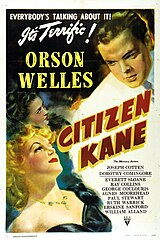
Orson Welles
October 10, 1985 (aged 70)
Ronda, Andalusia, Spain
- Actor
- director
- screenwriter
- producer
- magician
1931–1985
- Virginia Nicolson
- (married 1934–1940)
- Rita Hayworth
- (married 1943–1947)
- Paola Mori
- (married 1955–1985)
- Dolores del Río (1940–1943)
- Oja Kodar (from 1966)
3, including Beatrice
At age 21, Welles was directing high-profile stage productions for the Federal Theatre Project in New York City—starting with a celebrated 1936 adaptation of Macbeth with an African-American cast, and ending with the controversial labor opera The Cradle Will Rock in 1937. He and John Houseman then founded the Mercury Theatre, an independent repertory theatre company that presented a series of productions on Broadway through 1941, including a modern, politically charged Caesar (1937). In 1938, his radio anthology series The Mercury Theatre on the Air gave Welles the platform to find international fame as the director and narrator of a radio adaptation of H. G. Wells's novel The War of the Worlds, which caused some listeners to believe that a Martian invasion was in fact occurring. The event rocketed 23-year-old Welles to notoriety.[4]
His first film was Citizen Kane (1941), which he co-wrote, produced, directed, and starred in as the title character, Charles Foster Kane. It has been consistently ranked as one of the greatest films ever made. He directed twelve other features, the most acclaimed of which include The Magnificent Ambersons (1942), The Stranger (1946), The Lady from Shanghai (1947), Touch of Evil (1958), The Trial (1962), Chimes at Midnight (1966), and F for Fake (1973).[5][6] Welles also had roles in other directors' films, notably Rochester in Jane Eyre (1943), Harry Lime in The Third Man (1949), and Cardinal Wolsey in A Man for All Seasons (1966).
His distinctive directorial style featured layered and nonlinear narrative forms, dramatic lighting, unusual camera angles, sound techniques borrowed from radio, deep focus shots and long takes. He has been praised as "the ultimate auteur".[7]: 6 Welles was an outsider to the studio system and struggled for creative control on his projects early on with the major film studios in Hollywood and later in life with a variety of independent financiers across Europe, where he spent most of his career. Many of his films were either heavily edited or remained unreleased.
Welles received an Academy Award and three Grammy Awards among other numerous honors such as the Academy Honorary Award in 1970, the Golden Lion in 1970, the AFI Life Achievement Award in 1975, and the British Film Institute Fellowship in 1983. In 2002, he was voted the greatest film director of all time in two British Film Institute polls among directors and critics.[8][9] In 2018, he was included in the list of the 50 greatest Hollywood actors of all time by The Daily Telegraph.[10] Welles had three marriages, including one with Rita Hayworth, and three children.
Micheál Mac Liammóir, who played Iago in Welles's Othello, said "Orson's courage, like everything else about him, imagination, egotism, generosity, ruthlessness, forbearance, impatience, sensitivity, grossness and vision is magnificently out of proportion."[11]
Legacy and reception[edit]
David Thomson credits Welles with "the creation of a visual style that is simultaneously baroque and precise, overwhelmingly emotional, and unerringly founded in reality."[191] Peter Bogdanovich, who was directed by Welles in The Other Side of the Wind, wrote that "being directed by Welles was like breathing pure oxygen all day long. He was so totally in control that he never had to prove a point out of any kind. I never saw him get angry or impatient, or raise his voice in any way but hilarity... Sometimes Orson was holding the camera himself, but wherever the camera was, he had put it there, and all the lights were placed exactly where he said they were to be put. There wasn't anything seen or heard in any scene that wasn't there because Orson wanted it that way, but he was never dictatorial."[192] Welles was a lifelong lover of Shakespeare, and Bogdanovich writes that Chimes at Midnight, in which Welles plays John Falstaff, is "arguably his best film, and his own personal favorite";[193] Joseph McBride and Jonathan Rosenbaum have called it Welles's masterpiece, and Vincent Canby wrote "it may be the greatest Shakespearean film ever made."[194]
After Welles went to South America to film the documentary It's All True, RKO cut more than forty minutes from Ambersons and added a happier ending, against his wishes. The missing footage from Ambersons has been called a "holy grail" of cinema.[195] Welles wrote a 58-page memo to Universal about the editing of Touch of Evil, which they disregarded.[133] In 1998, Walter Murch reedited the film according to Welles's specifications.[196] With a development spanning almost 50 years, Welles's final film, The Other Side of the Wind, was posthumously released in 2018.
Known for his baritone voice,[197] Welles performed extensively across theatre, radio, and film. He was a lifelong magician, noted for presenting troop variety shows in the war years. He was a lifelong member of the International Brotherhood of Magicians and the Society of American Magicians.[198]









